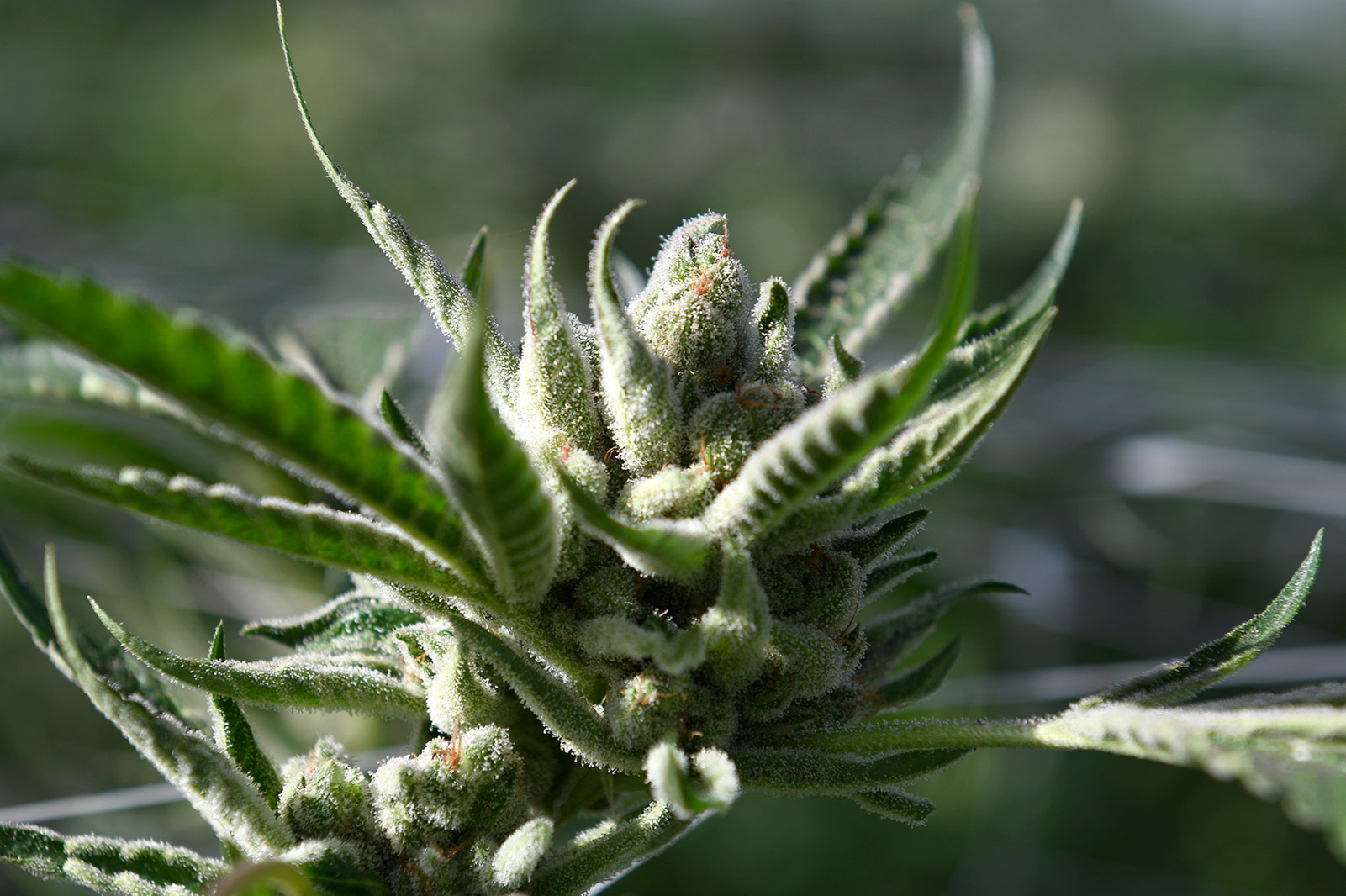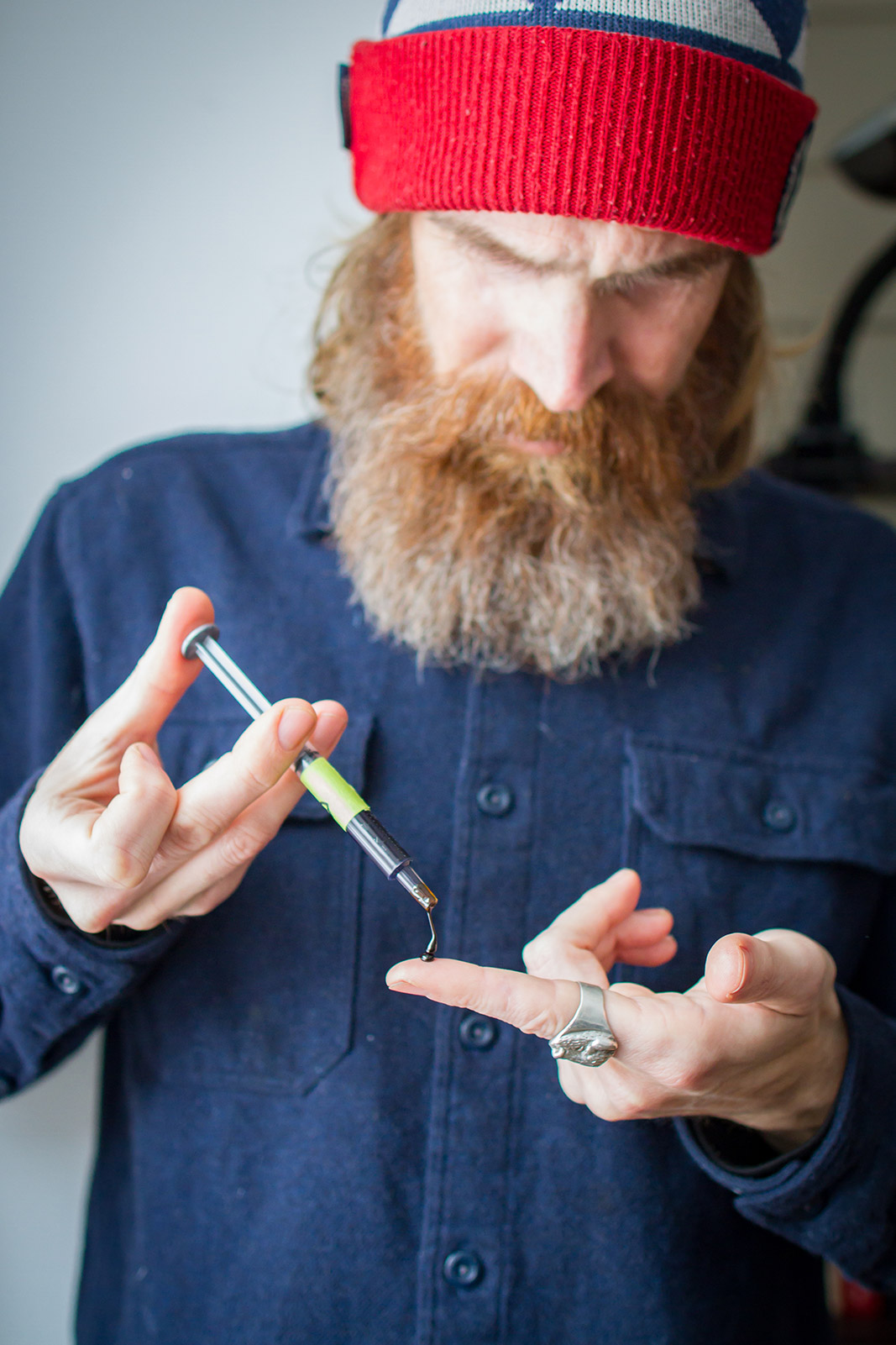
I fear I may be made out of marijuana. I dance with the devil’s lettuce daily, from breakfast through bedtime, consuming enough of this polarizing plant to knock down an elephant. And I’m doing this to save my life — that’s right, marijuana is helping to keep me alive.
I’m on the verge of 40 years old, and the past decade has not been kind: Amid both of my parents dying unexpectedly, my health unraveled into a morass of wicked diagnoses, including multiple sclerosis, Lyme disease, and metastatic pancreatic cancer of the neuroendocrine variety, made famous by Steve Jobs. I’m a regular at Stanford hospital, and if my doctors are to be believed, this cancer will kill me.
But death is not what I’m after. I have a daughter named Sawyer and a wife named Anna, and I plan to grow old with both. So in March 2016, when tests showed my cancer on the rise, I began pursuing cannabis as medicine, far beyond the usual toke of a joint or nibble of a brownie to feel better. Two years later, it’s become a critical tool in the fight of my life.

Once upon a time, I won an award for reporting on medical marijuana and even worked as a grower in the early days of the industry. For years, I heard stories of cannabis as a miracle cure, putting terminal cancer into remission, holding epilepsy in check, relieving chronic pain, and reducing debilitating anxiety. Unfortunately, the crazy tales often disappeared into the smoke of trim-table legends when I tried to verify them.
But I was desperate, so I dove into the most panicked and purposeful research of my career, working the phones and emailing long-lost contacts. Within days, I had my first tube of cannabis oil extract in my hands, and my journey as an accidental astronaut exploring the cosmos of cannabis medicine was about to begin.
Understanding Endocannabinoids
Today, more than 20 years since California voters legalized medical marijuana, most cancer patients are aware of its potential benefits. Almost all agree that it’s good for pain management and that it stimulates the appetite — both ideal for battling the effects of chemotherapy and radiation — and that, at the very least, it can improve quality of life.
This is all because of something called the endocannabinoid system (ECS), one of the most complex, widespread, understudied biological networks in the human body. Endocannabinoid receptors permeate the entire body, from the muscles, brain, and digestive tract to the nervous and immune systems. Optimal physiological health is not possible without a healthy ECS.
And how do you stimulate the ECS? Either via endocannabinoids, which the body produces and can also be found in breast milk, or via exocannabinoids, which are cannabinoids derived from the cannabis plant. That’s right — one of the most critical biological systems in your body is hardwired to receive stimulation from marijuana. In fact, your long-term health may even depend on it.

And yet our knowledge of how the ECS works with cannabis is grossly limited, largely thanks to the federal government’s arcane classification of marijuana as a Schedule I drug, which acknowledges no medical benefit. While nations such as Israel and Germany have researched cannabis for decades — especially since the 1990s, when the ECS’s primary receptors, CB1 and CB2, were first identified and copied — the United States only embarked on such efforts recently. As such, what we know pales in comparison to what we don’t. But experts agree that these ECS receptors are everywhere in our body — even on your cancer cells, and especially on your neuroendocrine cancer cells.
That was what powered my search for full-extract cannabis oil, which is a food-grade essential oil derived from entire marijuana plants. However medically naive it might have been, I hoped to hammer my ECS in order to possibly kill the cancer cells (by turning their apoptosis function back on) or fix some longstanding flaw in my immune system. It was a truly desperate and slightly deranged hope, but with the reluctant blessings of my medical team — including full support from my traditional Chinese medicine doctor and a tacit go-ahead from my oncologist — I dove into the deep end.
Flowering Frontiers
In basic, the leading advice on cannabis oil as cure suggests consuming 60 full grams over 60-90 days. Instead of starting slow as both patients and producers urged me to do, I took a full gram on day one. It was a Sunday, and I am fairly certain I saw God.
By Tuesday, I was a mess. I’d faint in the shower with visions of tumors blistering my liver. I’d sleep for 15 hours and hide under the covers when awake. I wrote birthday cards for my daughter for the years I would miss and made a list of people my wife should consider marrying when I was gone. I became convinced that I was killing myself quicker with the oil, yet I kept putting a peppery black drop of it on my left index finger every 90 minutes and licking it clean with hope in my heart.

And then, by day 12, I no longer felt stoned. By day 16, I was back to work. On day 19, I wrote in my journal, “Without doubt, this is the best and healthiest I have felt in years.” I finished the 60 grams in 53 days, consuming the equivalent of 20 ounces of marijuana in less than two months.
Then I went in for surgery on my liver. It did not go as planned. They hoped to remove the largest of six tumors, one that was about 16-18mm in size. But ultrasound couldn’t find it, so the surgeon had to “cut blind,” removing tissue based on past scans. After cutting out an oyster-sized chunk of liver, she found a pearl-sized tumor of cancer.

The pathology results confirmed the confusion: The tumor had shrunk to less than 6mm, it was the same density as the healthy tissue, and the Ki-67 index (which measures growth) was below 1. These were not standard findings for metastatic pancreatic cancer. “This is better than anything we could have hoped for,” said my surgeon in disbelief on a phone call that I’ll never forget. I started my next 60-gram round of oil minutes after hanging up.
That September, I was back at Stanford, my second round of oil complete, ready for tests. To everyone’s surprise, the scans showed zero signs of disease in my body. There were tears all around. I told my doctors that I thought it was due to the cannabis — it was really the only new tool in my belt at that point — but they weren’t ready to give it credit. As world-renowned experts in neuroendocrine cancer, they saw too many other variables in my health picture as possible explanations for the results. This was a team that had already saved my life twice, so I started weaning off my oil that afternoon. By December, I was moving toward “normal” for the first time in years.
When I returned to Stanford in spring 2017, I had gained weight, built muscle, and grown a beard. I was feeling terrific, fully expecting to ace my tests. I was wrong. My liver was flecked with multiple tumors. We were crushed. My cannabis miracle story evaporated in an instant.
The doctors wanted to immediately start a hormone therapy, a monthly injection regimen that I would have to continue for the rest of my life. But after some hard conversations, we made the controversial decision to hold off on the hormones and resume cannabis oil for three months. I returned to multiple daily doses of oil in mid-June.
When I returned to Stanford in September, I was prepared to start my hormone shots right away if the test results weren’t what we wanted. But there were no injections needed — my blood work was the best it had been in five years. My cancer markers were within “normal” range, and my scans were stable. I’ve been using cannabis extracts in some capacity every day ever since. Onward into the great unknown I continue to go.

To be clear, I don’t think cannabis cures cancer. The situation is way too complex and dynamic for such a statement to be accurate. But based on what we know about the ECS and what we’re learning about how cannabinoids and terpenes can positively affect it, only a fool would suggest further research is not needed. Thankfully, ECS studies are now ongoing about everything from chronic pain and diabetes to diseases of the nervous system and digestive system as well as different types of cancer.
But I am not sitting around waiting for the findings. I know, without a doubt, that for someone with my unique health profile, marijuana is an incredibly potent medicine. My life is all the proof I need.



